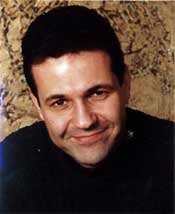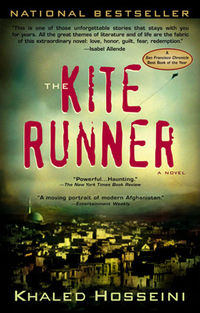
Sara Shereen Bakhshian of Beliefnet interviewed Khaled Hosseini about his blockbuster novel, “The Kite Runner,” the new movie, his faith and values, and about Islam in Afghanistan. To get to the interview click here. Below are some excerpts:
The movie adaptation of the blockbuster 2003 novel “The Kite Runner” arrives in theaters Dec. 14, and it’s already received a Golden Globe nomination for Best Foreign Language Film. The story focuses on the affluent youth Amir and his servant friend Hassan, who are separated by a horrific sexual attack and the 1979 Soviet Union invasion of Afghanistan–and later become connected as adults when the Taliban are in power. All this came from the imagination of doctor turned author Khaled Hosseini, the son of an Afghan diplomat who sought asylum for his family in Northern California after the invasion. Hosseini spoke with Beliefnet about the book, the fate of Islam in Afghanistan, and how he stays grounded after finding massive success with “The Kite Runner” and his current release, “A Thousand Splendid Suns.”
As you were writing the “The Kite Runner” book, what did you expect to happen after its release?
I had very modest hopes initially. I [hoped] a few people would actually read it. I wasn’t sure that this was the kind of book that would have wide appeal because it was set in a distant country [Afghanistan] that a lot of people didn’t know–and maybe even didn’t care much about.
As an Afghan, I hoped that [readers] would see Afghanistan–an Afghanistan that they don’t always see when they’re watching CNN or Fox or any other kind of news outlet, which focus on two or three of the usual things. I hoped that they would see a unique kind of window into Afghan culture: the way they eat and the way they live and the way they marry and the way they die and some other [depiction of] what life was like before the Soviets invaded.
How much of you is in the character of Amir?
His trials and tribulations are not necessarily mine, although I grew up in this pre Soviet war Kabul. I belonged to the same kind of [socio-economic] background as he did. I went to the same school as he. I was a writer at a very young age. In fact, the little short story that he writes in the film for Hassan was something that I had written, I think back in 1974. I loved flying kites with all my friends in Kabul. It was almost like a rite of passage…. I loved film, especially Westerns.
I got moved to the [United] States in the wake of the Soviet invasion, went through many of the immigrant experiences that he did with his father: Seeing all the professional Afghans who are now running gas stations and that sort of thing. So, all of that came from my life. But, the story line itself, what happens between the boys and so on, that’s imaginary.
The kite is just one of the many symbols in the story. Do you have a favorite symbol?
For me, the scene in the alley [where local bullies corner Hassan while Amir hides in the shadows] has always had a metaphoric quality to it, and the rape scene [of Hassan]. A lot of fellow Afghans feel like that’s what happened to their country, if you substitute Afghanistan for Hassan. After Hassan has served his purpose and found what Amir wanted, the kite, then Amir kind of stands by and watches him be attacked without intervening….
A lot of Afghans feel that’s what happened [after the Soviet Union left and Western countries failed to help the country].
There has been some opposition to the inclusion of the rape scene in the film. The parents of three young actors asked for producers’ help in relocating, and the movie’s release date was postponed to do so. How would you explain this opposition to someone who’s not familiar with the Afghan culture?
I understand that when the children were cast the producers had a lengthy discussion with the guardians and the children about that scene, because it is a difficult scene, I think, for any child of any nationality.
In Afghanistan, any sexual act depicted on the screen is fraught with sensitivity and delicacy, so this was not an easy scene to shoot…. I guess, later, there were some disagreement about how fully [the guardians and children] understood or they did not, but… I wasn’t present during those discussions to be able to give my side….
There were some suggestions from the community to remove the scene, but I don’t think that’s possible. Without that scene you really don’t have a movie. Certainly, the narrative [would fall] apart because what happens in that alley is so ugly and so reprehensible that it seers this character’s mind to the point that he is haunted as an adult and risks going back to Afghanistan because of that memory.
But ultimately the film is not about the scene that everybody has been talking about. The pivotal plot of the movie is not about rape; it’s not about sexual predators. It’s really about atoning for past mistakes. It’s about tolerance and forgiveness and fathers and brotherhood and I think very, very positive things. If you look at the film as a macro-chasm rather than microscopically, and sit back and look at the overall message of the film, I think it’s a very positive one. I believe that once people have had a chance to see the film and for its entirety, a lot of this controversy will die down.

